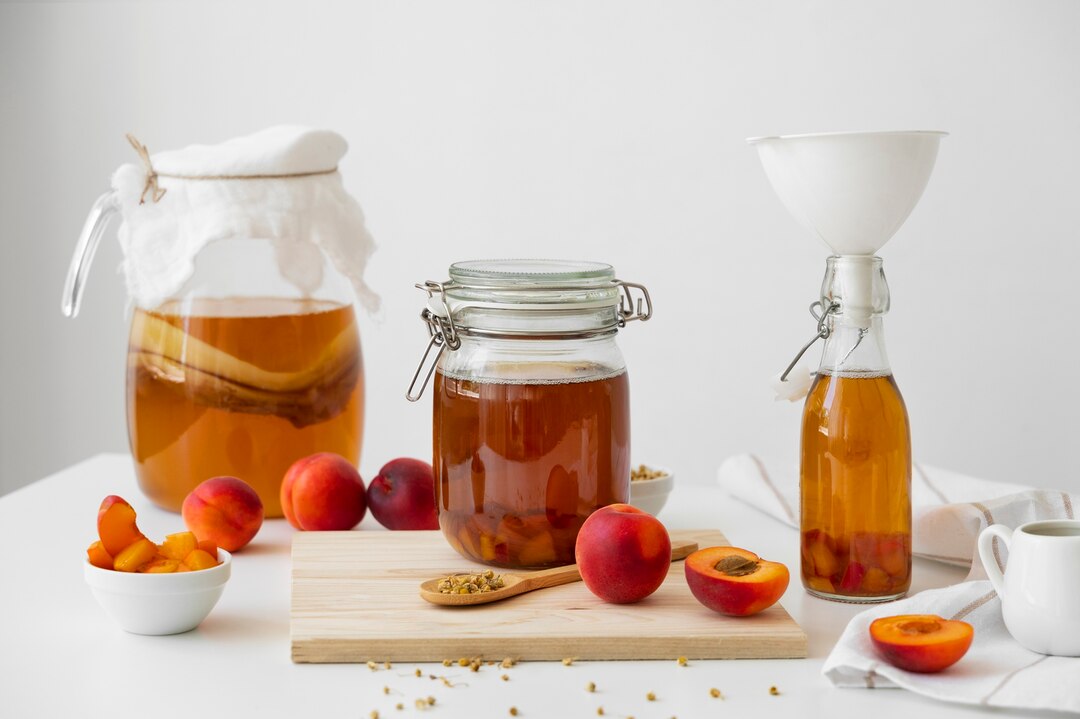In recent years, a fizzy, tangy, and health-boosting beverage has been steadily making its mark on the shelves of health food stores, supermarkets, and cafes alike. Kombucha, a fermented tea drink, has captured the taste buds and curiosity of consumers worldwide. From its humble origins to its current status as a trendy health elixir, let’s delve into the world of kombucha and discover why it’s becoming a favorite among wellness enthusiasts.
What is Kombucha?
Kombucha is a fermented tea beverage that dates back thousands of years, originating in East Asia. Traditionally made by fermenting sweetened tea with a symbiotic culture of bacteria and yeast (SCOBY), kombucha undergoes a natural fermentation process that results in a tangy, slightly effervescent drink. The fermentation process produces a variety of beneficial compounds, including probiotics, organic acids, and antioxidants, which contribute to its purported health benefits.
The Appeal of Kombucha
- Probiotic Power: Kombucha is often touted for its probiotic content, which may promote gut health by introducing beneficial bacteria into the digestive system. Probiotics are known to support digestion, boost immunity, and improve overall gut health.
- Vibrant Flavors: With its diverse range of flavors, from fruity and floral to bold and spicy, kombucha offers something for every palate. Popular flavor combinations include ginger, lemon, berry, and hibiscus, providing a refreshing and satisfying alternative to sugary sodas and juices.
- Low in Sugar: While some commercial varieties may contain added sugars or fruit juices for flavoring, traditional kombucha is relatively low in sugar compared to other sugary beverages. This makes it an appealing option for those looking to reduce their sugar intake without sacrificing flavor.
- DIY Appeal: Kombucha’s growing popularity has sparked a DIY movement, with enthusiasts brewing their own batches at home. Homebrewing allows for experimentation with flavors and ingredients, as well as greater control over the fermentation process.
- Cultural and Historical Significance: Beyond its health benefits, kombucha carries cultural and historical significance in many societies. It has been revered for centuries in Eastern cultures for its purported healing properties and is often associated with longevity and vitality.
Incorporating Kombucha into Your Routine
Whether you’re a seasoned kombucha connoisseur or a curious newcomer, there are countless ways to enjoy this fermented tea beverage:
- Straight Up: Enjoy kombucha chilled and straight from the bottle for a refreshing and revitalizing drink on its own.
- Kombucha Cocktails: Get creative in the kitchen by incorporating kombucha into cocktails and mocktails for a flavorful twist. Its effervescence and tangy flavor pair well with spirits, fruit juices, and herbal syrups.
- Kombucha Mocktails: For those avoiding alcohol, kombucha can also be mixed with sparkling water, fruit juices, or herbal infusions to create delicious and alcohol-free beverages.
- Kombucha Smoothies: Blend kombucha with your favorite fruits, vegetables, and protein for a nutritious and energizing smoothie that’s packed with probiotics and antioxidants.
- Kombucha Marinades and Dressings: Use kombucha as a base for marinades, salad dressings, and sauces to add depth of flavor and a hint of tanginess to your favorite dishes.
As kombucha continues to gain popularity, it’s important to approach it with an open mind and a sense of exploration. Whether you’re drawn to its health benefits, intrigued by its complex flavors, or simply looking for a refreshing alternative to sugary drinks, kombucha offers something for everyone. So go ahead, embrace the fizz, and raise a glass to the delightful world of kombucha. Cheers to good health and adventurous tastes!








